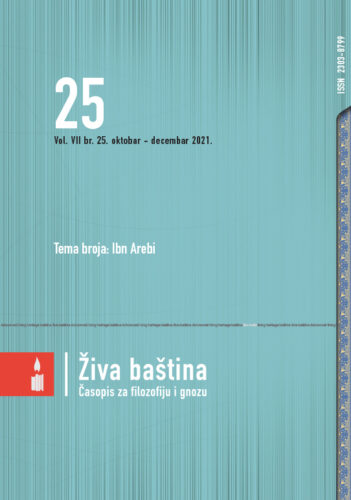U ovom tekstu se govori o životu i djelu perzijskog filozofa Afḍal al-Dīna Kāshānīja, poznatog i kao Bābā Afḍal. On je prema autorovom mišljenju iznesenom na drugim mjestima, najvažniji islamski filozof i ličnost koja zapravo ovaploćuje islamsku filozofsku tradiciju. Prvo se govori o životu ovog savremenika Suhrawardīja al-Maqtūla, Ibn Rushda i Ibn al-‘Arabīja, s tim da o njemu nema mnogo podataka. Zatim se izlažu Bābā Afḍalova učenja. Njegov cilj bio je razjasniti prirodu potrage za mudrošću koja mora potaknuti svaku filozofiju dostojnu tog imena. Filozofija je za njega način života koji uključuje uvježbavanje duše i sticanje vrlina. Nastojao je (u) svojim spisima potaknuti čežnju za izvorištem značenja, a to je inteligencija koja leži u srcu mudrosti. Naročito je zanimljiv način na koji rastumačuje svoja stanovišta, budući da preovladava izravan jezik koji ide u srce stvarî. Nakon toga se govori o perzijskoj filozofiji te izazovima prevođenja arapskih tehničkih termina. U nastavku, autor daje kratke opise svih poznatih Kāshānījevih spisa, raspoređenih u šest kategorija, spominjući također patvorena djela. Možda paradoksalno, sama činjenica da je Bābā Afḍal pisao prvenstveno na perzijskom jeziku objašnjava zašto je ostao donekle nepoznat unutar same perzijske filozofske tradicije. Otuda se bitnost ovog rada ogleda u predstavljanju ove gotovo nepoznate ličnosti u povijesti islamske filozofije, osobito na bosanskom govornom području.
Ključne riječi: Afḍal al-Dīn Kāshānī (Bābā Afḍal), život, djelo, učenja, perzijska filozofija, prevođenje, arapski tehnički termini, povijest islamske filozofije, perzijski jezik, spisi.
A Persian Philosopher
William C. Chittick
Abstract
This text discusses the life and work of the Persian philosopher Afḍal al-Din Kāshānī, also known as Bābā Afḍal. According to the author's opinion expressed elsewhere, he is the most important Islamic philosopher and the person who actually embodies the Islamic philosophical tradition. The life of this contemporary of Suhrawardī al-Maqtūl, Ibn Rushd and Ibn al-‘Arabī is first discussed, but the information about him is scarce. Next, the teachings of Bābā Afḍal are presented. His aim was to clarify the nature of the search for wisdom that must inspire any philosophy worthy of that name. For him, philosophy is a way of life that includes training the soul and acquiring virtues. In (with) his writings, he sought to inspire a longing for the source of meaning, and that is the intelligence that lies at the heart of wisdom. The way in which he interprets his views is especially interesting, since direct language that goes to the heart of things prevails. After that, Persian philosophy and the challenges of translating Arabic technical terms are discussed. In the following part, the author gives brief descriptions of all the known writings by Kāshānī, arranged in six categories, mentioning also forged works. Perhaps paradoxically, the very fact that Bābā Afḍal wrote primarily in Persian explains why he remained somewhat unknown within the Persian philosophical tradition itself. Hence, the importance of this work is reflected in the presentation of this almost unknown figure in the history of Islamic philosophy, especially in the Bosnian-speaking area.
Keywords: Afḍal al-Dīn Kāshānī (Bābā Afḍal), life, work, teachings, Persian philosophy, translation, Arabic technical terms, history of Islamic philosophy, Persian language, scriptures.
[tags]

